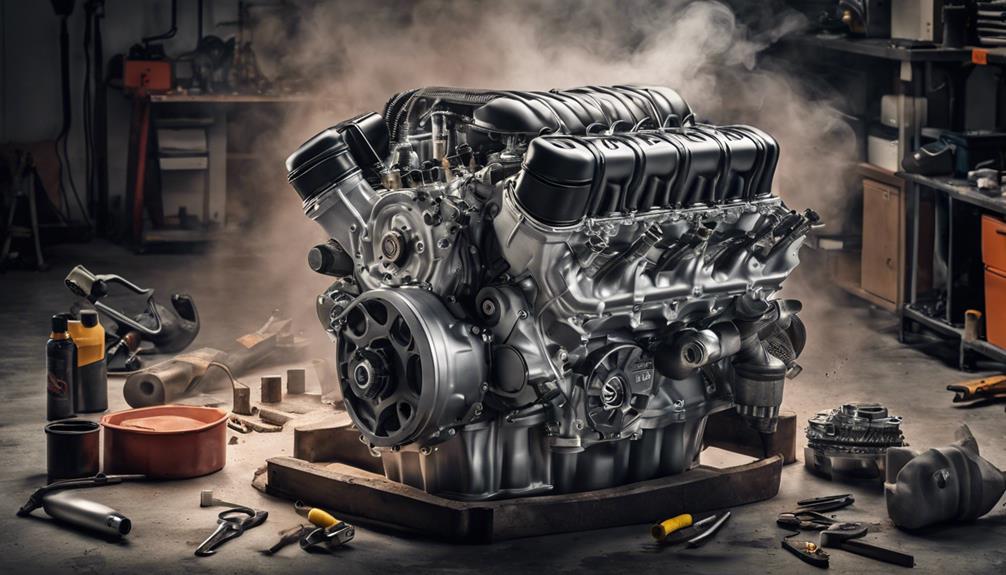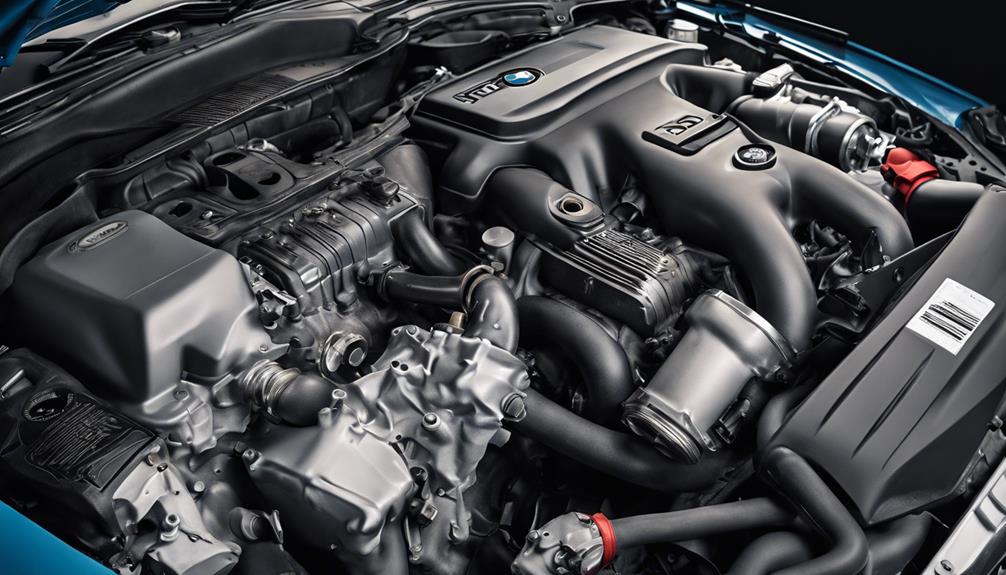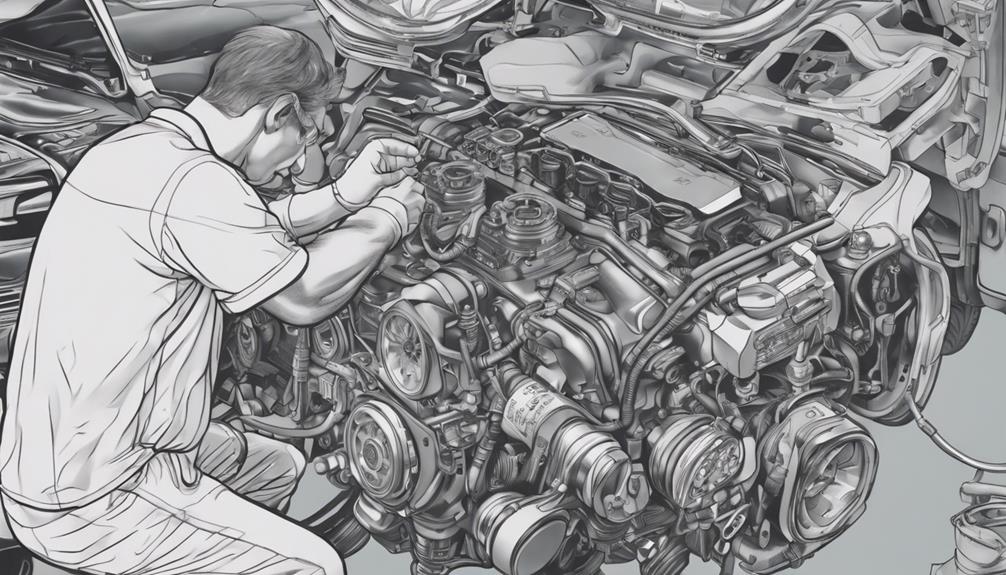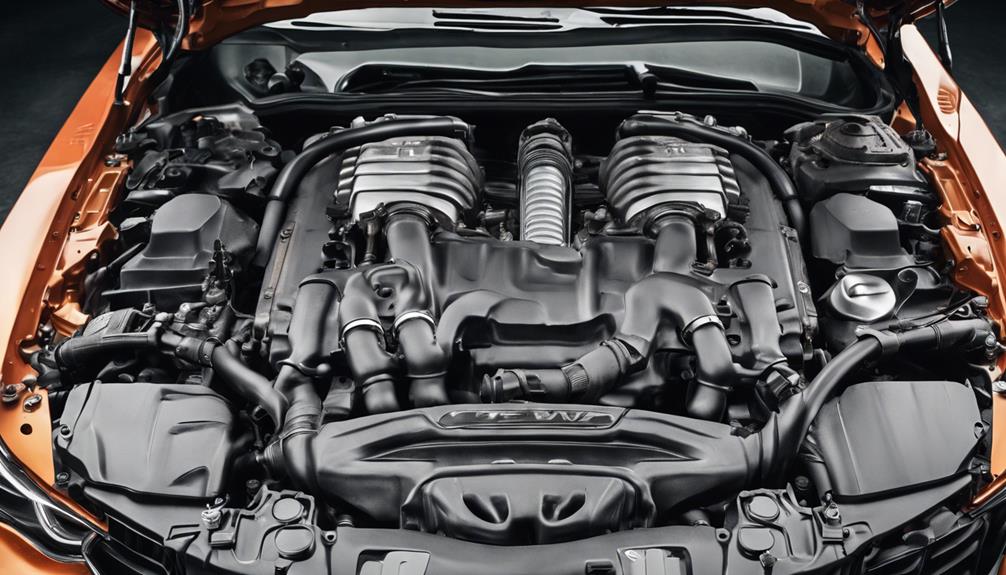If you own a BMW M760i, you might encounter various common problems. Watch out for brake pipes corrosion, especially the rear ones prone to corrosion despite upgrades. Stay wary of rear differential corrosion affecting performance, with options ranging from refurbishment to replacement. Keep an eye on tire wear, particularly the front tires wearing out fast, necessitating regular checks and alignments. Don't overlook leaking tires; prompt inspection and maintenance are crucial to safety.
Address engine issues like misfiring promptly with coil pack and sensor checks. Be vigilant for low oil pressure signs, hinting at potential gasket or pump issues. Air conditioning failures often stem from faulty condensers, leading to inadequate cooling. Handling these challenges guarantees your M760i stays in top shape for the long haul.
Key Takeaways
- Brake pipes corrosion despite upgrade, recheck necessary.
- Rear differential corrosion impacts performance, maintenance crucial.
- High-performance tires wear fast, monitor tread depth.
- Leaking tires risk safety, maintain proper pressure.
- Engine issues like misfiring and low oil pressure common.
Brake Pipes Corrosion
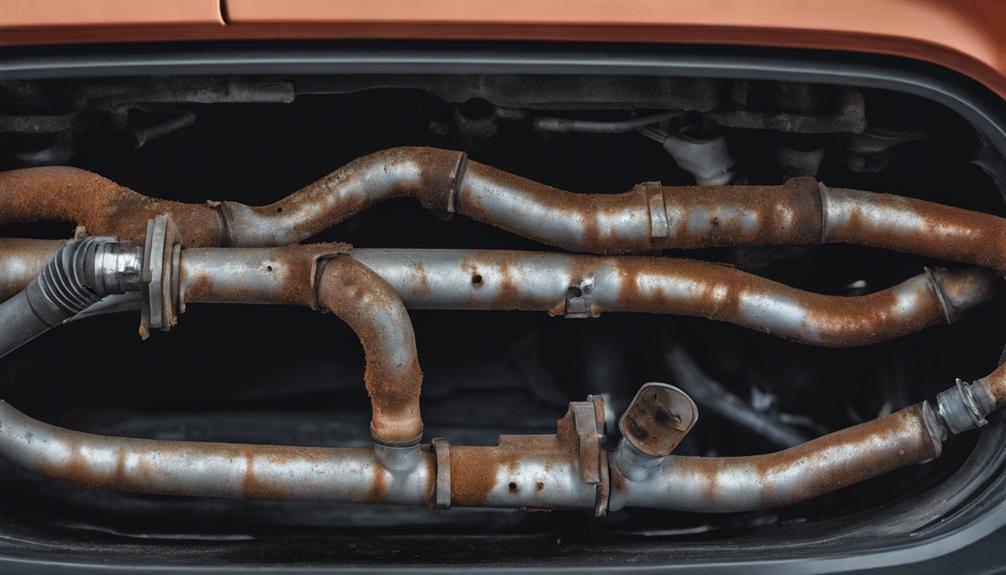
If you have ever pondered about the Achilles' heel of the BMW M760i, explore the perplexing case of the rear brake pipes corrosion. While the rear brake pipes were recently substituted with copper pipes, it's uncommon for them to corrode so soon after this upgrade. The initial inspection didn't raise any red flags, but the pipes were noted to be covered in grease, obscuring a clear view of their condition. This situation presents a puzzle as the recent replacement should have mitigated any corrosion concerns. However, given the critical role the brake system plays in ensuring your safety on the road, it's imperative to recheck the rear brake pipes promptly to assess the extent of the corrosion accurately.
The engine of your BMW M760i relies on a well-maintained brake system to function at its best. Any corrosion or damage to the brake pipes could compromise the efficiency of the braking system, posing a potential safety hazard. Hence, staying vigilant and addressing this issue promptly is essential to maintain the performance and safety standards of your luxury vehicle.
Rear Differential Corrosion
When it comes to rear differential corrosion in your BMW M760i, understanding its impact on performance is essential. Knowing preventive maintenance tips can help you stay ahead of any potential issues.
Keep an eye out for common signs of corrosion to make sure your rear differential stays in top shape.
Corrosion Impact on Performance
Amidst the intricacies of BMW M760i maintenance, the rear differential corrosion advisory stands as a nuanced consideration, blending precaution with practicality.
While the N74 engine's prowess is unquestionable, the potential impact of rear differential corrosion on performance remains a topic of debate. The advisory, although expected, raises questions about the necessity of immediate action.
Given the non-structural nature of the rear differential, the severity of the issue is somewhat mitigated by the thickness of the casing. Should corrosion manifest, options range from refurbishment to replacement, ensuring that performance isn't unduly compromised.
Ultimately, the advisory serves as a reminder of the importance of meticulous maintenance in preserving the M760i's driving experience.
Preventive Maintenance Tips
In safeguarding your BMW M760i against potential rear differential corrosion, adopting proactive maintenance measures is key to ensuring excellent performance and longevity.
To prevent corrosion, you should regularly check the rear differential for any signs of rust or damage. Additionally, ensuring that the differential casing is intact and free of any cracks or leaks is essential.
Consider applying a protective coating to the differential to provide an extra layer of defense against corrosion. Moreover, maintaining the proper level of engine oil in the differential can help prevent corrosion by reducing friction and heat buildup.
Common Signs of Corrosion
Examining the rear differential of your BMW M760i regularly is essential for recognizing typical signs of corrosion and ensuring peak performance and longevity. When inspecting for corrosion, keep an eye out for any unusual discoloration, pitting on the surface, or flaking of the metal. These can be indicators of potential corrosion issues that need addressing promptly.
In some cases, corrosion around the oil cooler fittings could lead to leaks, affecting the efficiency of the differential. It's vital to act swiftly if you notice any signs of corrosion to prevent further damage and maintain the best functioning of your rear differential.
- Look for any unusual discoloration, which could indicate corrosion starting to form.
- Check for pitting on the surface of the rear differential, as this may signal ongoing corrosion.
- Monitor the oil cooler fittings for signs of corrosion, especially around the connections.
Tire Wear
When driving the BMW M760i, closely monitoring tire wear becomes essential due to its high-performance characteristics and the impact of driving habits and road conditions. The front tires of the M760i are particularly prone to wearing close to the legal limit, especially considering the vehicle's powerful nature. To guarantee safety and peak performance, it's vital to regularly check the tire tread depth. The M760i's high-performance design can lead to faster tire wear compared to standard sedans, making it imperative to stay vigilant.
To maximize the lifespan of the tires on your BMW M760i, consider scheduling regular alignment checks and rotations. These maintenance tasks can help distribute wear more evenly across the tires. Additionally, keeping your tires properly inflated, aligned, and well-maintained will go a long way in ensuring they last longer. By paying attention to tire wear and following a proactive maintenance schedule, you can enjoy the full performance capabilities of your BMW M760i while staying safe on the road.
Leaking Tires

Leaking tires on the BMW M760i can result from various issues such as bead leaks or punctures, requiring prompt attention to maintain ideal tire pressure and safety. Proper maintenance is key to making sure your BMW M760i's tires stay in top condition.
Here are three important tips to help you address leaking tires effectively:
- Regular Inspections: Make it a habit to visually examine your tires for any signs of leaks or damage. Catching issues early can prevent further problems down the road.
- Check Tire Pressure: Keep a close eye on your tire pressure and make certain it's at the manufacturer's recommended levels. Proper tire pressure not only improves performance but also extends tire life.
- Address Issues Promptly: If you notice any leaks or loss of tire pressure, don't delay in getting it checked by a professional. Quick action can prevent accidents and maintain the safety of your driving experience.
Engine and Engine Cooling Problem
Amidst the advanced engineering of the BMW M760i lies a notable concern regarding its engine and engine cooling system. Owners of the 2017-2018 M760Li xDrive models were met with an unexpected hiccup – a recall due to a faulty engine oil cooler line leading to oil leaks. This issue, though important, was swiftly addressed by replacing the problematic oil cooler line.
Oil leaks can be a tricky headache to deal with, especially when it involves a high-performance vehicle like the M760i. Keeping a close eye on oil levels and regularly inspecting for any signs of leakage can help catch this problem early on. If you do notice an oil leak, it's vital to address it promptly to prevent any potential damage to the engine and guarantee the vehicle runs smoothly.
In the world of luxury performance cars, even a minor oil leak can put a damper on your driving experience. Stay vigilant, and don't let a little oil dampen your M760i's performance.
Engine Misfiring
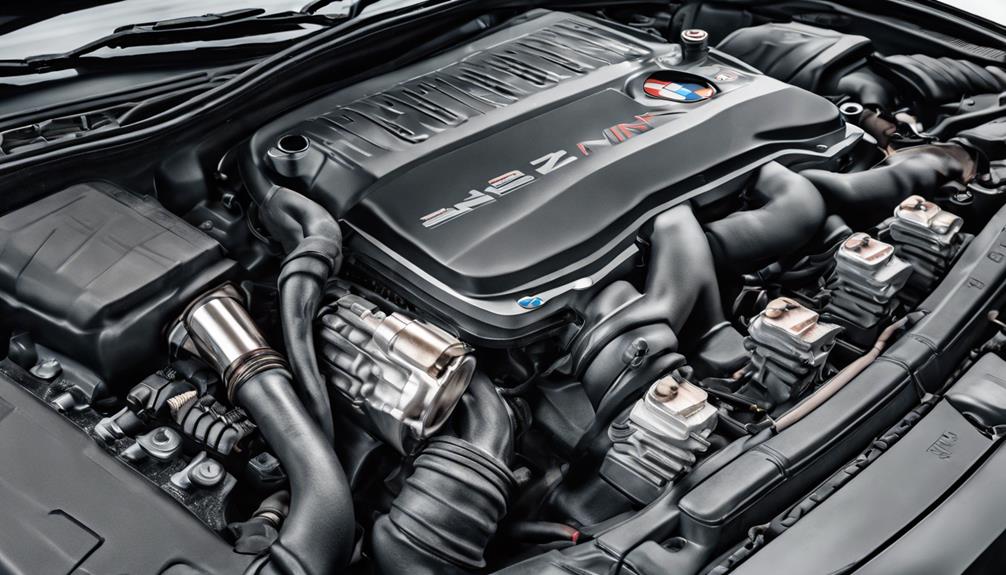
Addressing engine misfiring promptly in your BMW M760i is vital to maintaining its peak performance and efficiency. When your engine misfires, it can cause an unstable idle, leading to a rough driving experience.
To tackle this issue effectively, consider the following:
- Inspect the Coil Pack: A faulty coil pack is a common culprit behind engine misfiring. Make sure it's in good condition and delivering the necessary spark to the cylinders.
- Check the Sensors: Problems with the camshaft or crankshaft sensor can also trigger engine misfiring. These sensors play an essential role in the engine's timing, so any malfunction can lead to misfires.
- Replace Faulty Components: Once you've identified the problematic component causing the misfire, promptly replace it. Addressing the issue swiftly will help maintain the overall performance and efficiency of your BMW M760i.
Low Oil Pressure
If you've noticed a sudden drop in oil pressure in your BMW M760i, a culprit could be a faulty oil filter gasket.
Keep an eye out for that check engine light, as it often signals low oil pressure.
Tackling the issue promptly by fixing the gasket is key to maintaining your engine's health.
Causes of Low Pressure
Experiencing low oil pressure in your BMW M760i can be a sign of a leaking oil filter gasket, potentially leading to engine complications. If you notice this issue, it's important to address it promptly to prevent further damage.
Here are three key causes of low oil pressure in your BMW M760i to watch out for:
- Leaking Oil Filter Gasket: A common culprit for low oil pressure, a leaking oil filter gasket can lead to a drop in oil levels and pressure.
- Clogged Oil Passages: Build-up of debris or sludge in the oil passages can restrict the flow of oil, causing a decrease in oil pressure.
- Worn Out Oil Pump: A worn-out oil pump may struggle to circulate oil effectively, resulting in low oil pressure readings.
Warning Signs to Watch
Keep a keen eye out for subtle clues that could hint at low oil pressure in your BMW M760i. If you notice the check engine light illuminating or observe a sudden drop on the oil pressure gauge, it might signal a potential issue with oil pressure.
Low oil pressure in your BMW M760i could stem from a leaking oil filter gasket, which can greatly diminish oil pressure levels. Addressing this promptly is essential to prevent engine damage and guarantee peak performance.
Monitoring your oil pressure gauge regularly is key to detecting any anomalies promptly. Remember, maintaining proper oil pressure is crucial for the health and longevity of your BMW M760i's engine.
Air Conditioning Failure

When the air conditioning in your BMW M760i fails, a faulty condenser could be the culprit, resulting in only ice-cold air blowing. Addressing this issue promptly is vital to guarantee your comfort and convenience while driving. Here's what you need to know:
- Don't Sweat It: A malfunctioning condenser can lead to inadequate cooling performance, especially on hot summer days. Getting it fixed promptly will help you stay cool and collected during your drives.
- Cool Down with Replacement: To effectively resolve the air conditioning problem, replacing the faulty condenser is necessary. This step will restore your system's functionality and make sure you can enjoy the perfect cabin temperature.
- Preventive Measures: Regular maintenance checks that include inspecting the air conditioning system are essential. By catching potential issues early on, you can prevent major failures and keep your BMW M760i's air conditioning running smoothly.
Stay chill and keep your BMW M760i's air conditioning in top shape to enjoy a comfortable ride every time.
Frequently Asked Questions
Is the BMW M760i a Good Car?
Absolutely, the BMW M760i is a fantastic car! With its powerful V12 engine, luxurious features, and impressive performance stats, you'll enjoy the blend of power and comfort this flagship sedan offers.
How Reliable Is BMW V12 Engine?
When it comes to the reliability of the BMW V12 engine, you might encounter issues like oil leaks, misfiring, or low oil pressure. Keeping an eye on these common problems can help you enjoy a smoother ride.
How Many V12 M760i Were Made?
About 1,520 BMW M760i V12 models were crafted, presenting 600 horsepower and 590 lb-ft of torque. The rarity of these high-performing luxury sedans enhances their appeal, making them a coveted choice for enthusiasts seeking power and prestige.
Is BMW 760Li Discontinued?
Yes, BMW discontinued the 760Li after the 2020 model year. If you're in the market for a V12-powered BMW sedan, you'll need to explore pre-owned options since the 760Li is no longer in production.
Conclusion
So if you're in the market for a BMW M760i, be prepared to keep an eye out for these common problems.
From brake pipes corrosion to engine misfiring, it's important to stay on top of maintenance to guarantee your luxury vehicle stays in top condition.
Remember, a little preventative care can go a long way in avoiding costly repairs down the road.
Drive smart, stay informed, and enjoy the ride!






